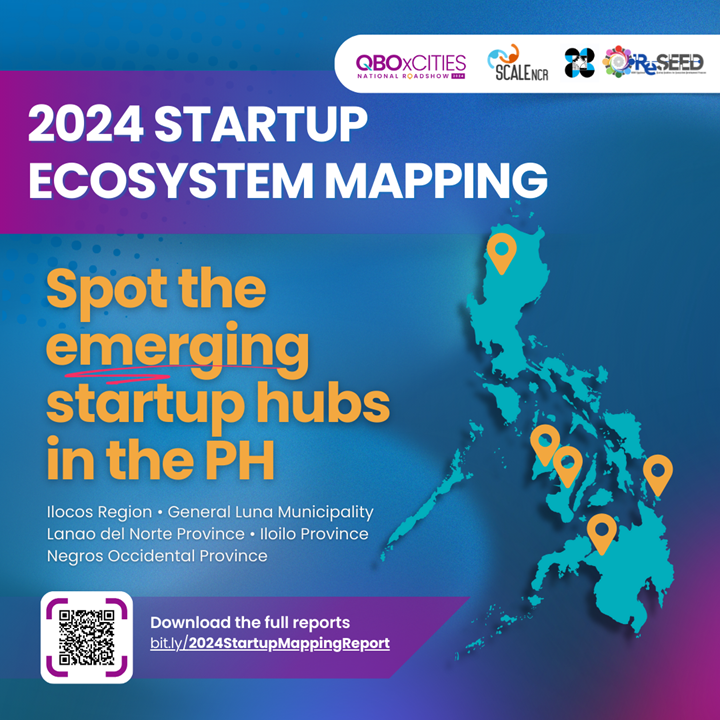
The Philippine startup ecosystem is experiencing significant growth, with regional hubs expanding across the country.
This is the finding of the 2024 Startup Ecosystem Mapping Reports by QBO Innovation, the Philippines’ first public-private initiative geared towards providing a platform for the startup community to collaborate, develop, and grow.
The initiative is in collaboration with the Department of Science and Technology through the Philippine Council for Industry, Energy and Emerging Technology Research and Development (DOST-PCIEERD) and the Strategic and Collaborative Alliance for Leveraging Ecosystem of Startups – National Capital Region (SCALE NCR).
Through discussion with key community drivers, gathering local insights, and validating data, the reports provide a comprehensive overview of each ecosystem’s current state, identifying movers and champions, available resources, success stories, and growth potential. Most importantly, they offer actionable insights on how ecosystem enablers can drive further development and foster long-term sustainability.
The reports focused on providing critical insights into five key locales: Region I (Ilocos Region), Lanao del Norte, Iloilo, Negros Occidental, and General Luna, Surigao del Norte.
According to the report, Iloilo stands out for its strong government support, with local policies and initiatives designed to foster startup growth, a model that other emerging startups could learn from. Negros Occidental benefits from strong collaboration between the academe and industry, creating a steady pipeline of talent and fostering innovation in Metro Bacolod’s growing startup scene. The report has found Lanao del Norte has a thriving base of young tech talent, supported by academic institutions and active local enablers driving interest in entrepreneurship. Meanwhile, General Luna is home to a vibrant community of digital nomads and tech workers, presenting opportunities to integrate this talent into startup activities, while Region I is witnessing increasing startup activity, particularly in key urban centers like Laoag and Dagupan, where innovation is beginning to take root.
While there is budding growth in the areas surveyed, the report reveals that startups across all locations still face challenges in scaling, with limited access to funding, industry connections, and broader markets. While local ecosystems are growing, many startups struggle to expand beyond their immediate communities. Strengthening investment opportunities and industry linkages will be key to helping regional startups scale nationally and globally.
“Regional development is essential to strengthening the country’s overall innovation landscape. These reports serve as a roadmap for empowering local startup ecosystems, bridging gaps, and unlocking new opportunities for innovation-driven growth. For startup founders and aspiring tech entrepreneurs, this means greater access to support networks, funding opportunities, and industry collaborations that can help turn ideas into scalable ventures. By working together, ecosystem builders, policymakers, and investors can fuel the next wave of Philippine startups, ensuring that innovation thrives in every corner of the country,” said Alwyn Rosel, Executive Director of QBO Innovation.
The 2024 Startup Ecosystem Mapping Reports were also made possible in partnership with local enablers, including UMWAD Western Visayas, the Mariano Marcos State University (MMSU) Bannuar Technology Business Incubator (TBI), the Surigao del Norte State University (SNSU) WAVES TBI, the Mindanao State University-Iligan Institute of Technology (MSU-IIT) iDEYA, the Iloilo Science and Technology University (ISAT-U) Kwadra TBI, and the Technological University of the Philippines Visayas (TUPV) HIVE TBI.
Building on the success of the 2024 reports, QBO Innovation is already underway with the 2025 initiative, with visits to Cagayan and Isabela. They encourage other locales to partner and contribute to this ongoing effort, facilitating a broader understanding and strengthening of the Philippine startup ecosystem.

